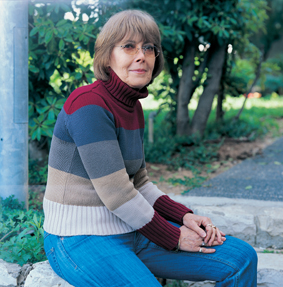In the fields of observation, chance favors only the prepared mind.
- Louis Pasteur, 1854
Serendipity - making fortunate discoveries by accident - has played a role in some of the most influential scientific achievements. This is more or less what happened to Prof. Nava Dekel of the Weizmann Institute's Biological Regulation Department. "It all began with a straightforward study," says Dekel, "but it has turned into something completely unexpected, opening up new research directions that might give hope to women with fertility problems."
Dekel was originally interested in discovering whether a specific protein, known to form channels for communication between neighboring cells, plays a role in the implantation of the fertilized egg into a woman's uterus. This stage is a critical one - IVF treatments most often fail at or soon after implantation. In an ongoing collaboration with Kaplan Hospital, Dekel and her research team recruited 12 women, all of whom suffered from fertility problems and had failed to conceive after numerous IVF treatments, and took a series of uterine biopsies at different stages in the menstrual cycle. After analyzing the results, the team found, as they had predicted, that levels of the protein under study undergo changes during the menstrual cycle, and the production patterns did, indeed, point to a role for this protein in the successful implantation of the fertilized egg in the uterus.
So far, they'd found what they were looking for and everything was going according to plan. The surprise was just around the corner: Of the 12 women who participated in the study, 11 became pregnant during the next round of IVF. Was this merely a coincidence, or did the biopsies somehow effect a "magic touch"? Dekel set up another experiment, again involving women who had problems conceiving. This time, however, they divided the patients into a group of 45 volunteers who had biopsies taken and a control group of 89 women who did not undergo biopsy. There was no doubt about it: The biopsy procedure had somehow managed to double the pregnancy success rate.
How does a simple biopsy create such a dramatic increase in pregnancies? "It seems counter-intuitive. How can injury lead to a positive outcome?" Dekel wondered. She suggests, on the basis of this and other evidence obtained from previous studies, that some form of distress, in this case a biopsy procedure, provokes a response that renders the uterus more receptive to implantation. Dekel and her team are continuing to investigate, looking for the exact mechanisms involved when an unreceptive uterus turns into a receptive one as a result of local injury. Both animal studies and human clinical trials are now being conducted to identify genes that may play a role in this process.
From an accidental finding, these scientists have started down a new path of inquiry that may, in the future, give birth to new treatment procedures to improve the success rate of IVF or even tackle some types of fertility problems directly.
This study is conducted by Dekel and Drs. Yael Kalma and Yulia Gnainsky (former and present post-doctoral fellows, respectively), in collaboration with Drs. Amichai Barash and Irit Granot of the In Vitro Fertilization Unit of the Kaplan Medical Center Obstetrics and Gynecology Department.
Prof. Nava Dekel's research is supported by the Y. Leon Benoziyo Institute for Molecular Medicine; the Willner Family Center for Vascular Biology; the Dwek Family Biomedical Research Fund; the Paul Godfrey Research Foundation in Children's Diseases; the Rachel and Shaul Peles Fund for Hormone Research; Mr. Max Candiotty, Los Angeles, CA; and Shimon Shestovich Ltd. Prof. Dekel is the incumbent of the Philip M. Klutznick Professorial Chair of Developmental Biology.
